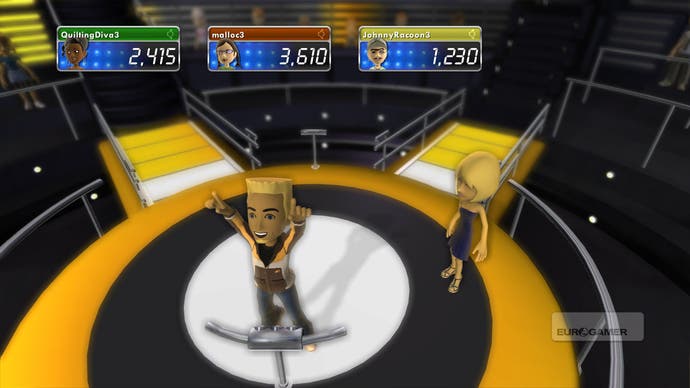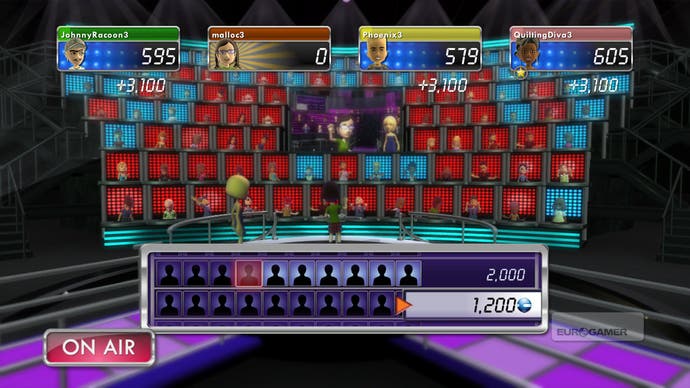1 vs. 100
Trivial pursuit?
Once upon a time, I moved to a small town where I knew no one and joined a pub quiz team in a bid to make friends. Things started well - I impressed my team-mates by being able to translate "nom de plume" and won a round of applause for knowing who wrote The Canterbury Tales. But it all ended in a terrible row over my cast-iron insistence that the Lord of the Rings was not, in fact, written by J.K. Rowling.
I have no idea what the people on that team are doing now, but I wouldn't be surprised to learn the people organising the pub quiz now have jobs composing questions for 1 vs. 100. If it's rigorous intellectual challenge you're after, Microsoft's new Xbox Live gameshow isn't the answer. Take this sample question from Friday night's debut show: what colour do you get if you mix blue and green?
In the rare instances you're not instantly sure of the answer, you'll know it the minute the daft multiple-choice options pop up. You might not know offhand which Swedish actor appeared in 1971's Get Carter, but you'd probably be willing to bet it was Britt Ekland rather than Ulrika Jonsson or Sven Goran-Eriksson. Unsure which Python did a voice-over for Shrek 2? Not when the options are John Cleese, John Breeze or John Sneeze.
Even if you know nothing about the subject at hand the options make it easy to guess correctly. I barely know what shape a football is, let alone who won the 2009 Premiership, but I guessed it was more likely to be Manchester United than Accrington Stanley or Bolton Wanderers. Occasionally, the specialist subject questions almost border on difficult - movie buffs might feel smug for knowing the answer to, "In Citizen Kane, what was Kane's last word?" But then they go and spoil it all by saying something stupid like, "In the Beatles film, what is the colour of the submarine?"

Questions don't get harder as rounds go on so there's no sense of progression. There are never any moments of tension as you try to remember an answer on the tip of your tongue, because the silly options shout it right out. On top of this, the question-writers seem to have confused the concept of including clues in the question with including unnecessary detail in the question. Take, for example, "Chris Martin, who married Gwyneth Paltrow in 2003, is the lead singer of who?" I'd have been stumped if they'd said the Chris Martin who married Gwyneth Paltrow in 1984.
But do daft questions make for a bad gameshow? After all, millions of people watch The Weakest Link. Deal or No Deal is even more popular and doesn't feature any questions at all. Those shows have got other stuff to offer though - Anne Robinson and her winky rudeness, or Noel Edmonds, a mysterious banker and contestants who think luck is more powerful than maths. So what does 1 vs. 100 have?
The clue is in the title. As you'll know if you read our preview, 1 vs. 100 is based on the TV show of the same name. A player is selected at random to be The One and take on 100 other players, who comprise The Mob. Everyone else becomes part of The Crowd. Each time The One answers a question correctly, everyone in the Mob who got it wrong is knocked out. If The One gets it wrong, he or she is out and the Mob shares the prize.

At regular intervals The One is asked to choose The Money or The Mob - to walk away with the prize money accumulated so far, or keep trying to knock out the members of The Mob. Only by defeating all 100 of them can he or she win the really big prizes. The One also has a few lifelines, such as the option to see which answer the majority of Mobsters picked or copy the answer of the top-scoring player.
While all this is going on, The Crowd gets to answer the same questions. They score points for correct answers and there are bonuses for speedy response times, but there are no prizes to be won - it's just for fun. Which is where the easiness of the questions does become a bit of an issue. 1 vs. 100 isn't really about how good your general knowledge is, it's about how fast you can press a button. It's Trivial Pursuit reduced to a series of quick-time events. And when there aren't even any real prizes at stake, it's hard to care.
Things must be different if you're chosen to be The One or to join The Mob, but I wouldn't know. Apparently your chances of being selected increase if you answer quickly and consistently while playing in The Crowd. I played for two solid hours and scored pretty well, but lots of other people must have done the same as I didn't get picked once. Nor did any of the other three Eurogamer staffers playing, who were all online for between 60 and 90 minutes.


